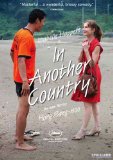| Reviews & Columns |
|
Reviews DVD TV on DVD Blu-ray 4K UHD International DVDs In Theaters Reviews by Studio Video Games Features Collector Series DVDs Easter Egg Database Interviews DVD Talk Radio Feature Articles Columns Anime Talk DVD Savant Horror DVDs The M.O.D. Squad Art House HD Talk Silent DVD
|
DVD Talk Forum |
|
|
| Resources |
|
DVD Price Search Customer Service #'s RCE Info Links |
|
Columns
|
|
|
In Another Country
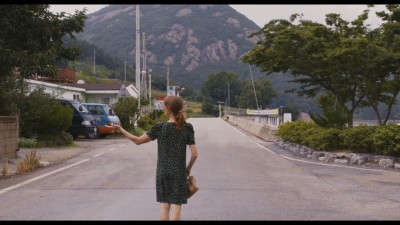
Much like the foreigner-in-Korea character(s) played by French screen legend Isabelle Huppert in In Another Country -- Korean director Hong Sang-soo's (Night and Day) latest deceptively easygoing stroke of genius -- we have no idea what adventures and twisty-turny, unpredictably forking and interconnecting paths await us during our stay in Hong's movie wonderland. As with many of Hong's works, the film is at first glance quite pleasantly modest and compact, a delicate contrapuntal piano piece, pretty with a melancholy undertow, by scorer Jeong Yong-jin accompanying the colorful, childlike scrawl of the credits; there's no Importance-exuding, cultivated aura or mood-setting to portend just how detailed and involved Hong's tale is going to get. The film's idea -- laid out in plain, straightforward terms -- initially seems only slightly left-of-center: A young Korean woman (Jung Yoo-mi), stuck with her mother (Yoon Yeo-jeong, The Housemaid) in Mohang, a backwater, low-rate Korean seaside resort town, as they live down and try to untangle some unpleasant family business involving an uncle's financial malfeasance, attempts a mental escape, sitting down with pad and pen to write a script about a French woman, Anne (Huppert, Heaven's Gate, White Material), visiting the same deserted resort town. This becomes, as the Korean girl's script plays out, three tales, each with their own version of Anne and each jumbling and altering the same story and character elements in a number of ways. These are arthouse-cinema commonplaces, the retold/revised story (occurring everywhere from Rashomon to Hou Hsiao-hsien's Three Times) and the unconventional duplicating or splitting of roles between an actor or actors (That Obscure Object of Desire, Mulholland Drive, etc.), but the cinematic territory of which Hong can by now be recognized as contemporary king is different, more atypically playful in its self-reflexive refractions and subversions of story and character, and In Another Country thus has a fleet, spontaneous, light feel to it that makes its paradoxical, very subtly, very gradually revealed engagement with some of art's and life's most deep, serious, troubling questions that much more trenchant and moving.
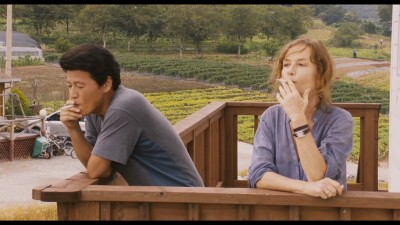
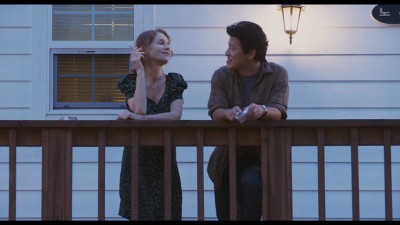
Hong's gift is expansive, allowing those profounder matters to blend smoothly with flat-out comedy. In Another Country is, among other things, likely the funniest Hong picture I've seen thus far, much of its second part a sort of screwball fantasy, with much of the humor elsewhere deriving from language and cultural barriers. Anne, her Korean hosts, and Mohang's townspeople share only (often rather rough) English as a common tongue, their grasp of that language sometimes hilariously inadequate (on Anne's part, too) to communicate with any precision, with Korean reserved for comments she's not necessarily meant to understand. This affectionately humorous (but actually somewhat sad when you think about it -- such are the quiet contradictions Hong gives us access to) language-barrier element is present across the three episodes, as are consistent references by Korean characters to the dubious trustworthiness of Korean men (slightly incongruous until you remember the girl ostensibly writing the script and her infernally troublesome, intensely disliked uncle); Anne's being torn between the flirtations of a Korean film director (Kwon Hae-hyo) with a very pregnant, diligently wary wife (Moon So-ri, a marvelous comedienne) in tow, and those of a handsome young lifeguard (Hong regular Yoo Jun-sang) who lives in a tent near the beach and earnestly falls for Anne, even composing an ode-to-Anne love song on his guitar; and Anne's search for what is apparently Mohang's only sight worth seeing, an elusive lighthouse, which she has the most difficult time describing as she poses questions to Koreans regarding its location, and which is only seen as its life-size self in one of the Anne's dreams, and perhaps in a miniature version as a lantern the lifeguard keeps in his tent.
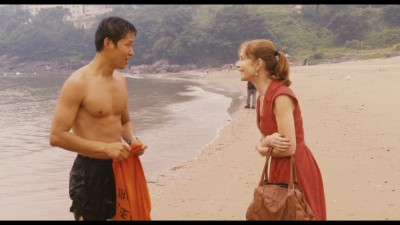
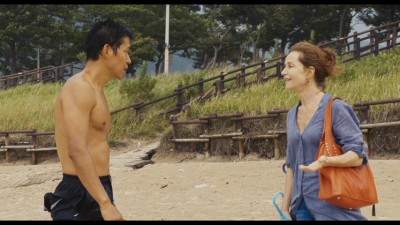
Those romantic daydreams, indulged in by the second Anne we meet (an adulterous, wealthy Seoul housewife, who seems to see herself as some sort of romantic-comedy character and who's come to Mohang for a tryst with her Korean film-director lover, this director played not by Kwon but by Moon Sung-keun) already disrupt the apparent triptych; they're clues to the layerings that make the film's narrative structure more a hall of mirrors than a tidily divided, three-successive-episodes affair. The three color-coded Annes -- blue costumes for the first, a French director (the film's multitude of film-director characters is a sly, perhaps self-deprecating fillip on Hong's authorial part); red dress, heels, and nails for the second, the aforementioned coquettish housewife with her romantic dreams; and green for the third, a lost-and-seeking divorcee whose husband has left her for a Korean woman -- may, may be discrete entities. But the other character and story elements simply won't stay put, wandering in and out of each of the three Annes' stories and insouciantly blurring them together, creating a puzzle whose pieces fit at unexpectedly, pleasingly odd angles. The pregnant wife's mission to find her truant husband stretches, effectively unaltered, across the three parts; a broken soju (Korean liquor) bottle on the beach remarked upon bitterly by the pregnant wife to the first, blue Anne is apparently the same one dashed onto the sand by the third, green-clad Anne as she drinks away her post-divorce sense of unmoored abandonment; an umbrella stashed away under a doorstep for safekeeping by one Anne is nonchalantly remembered and retrieved by another. The film becomes nests of stories within stories all inside (and also informed by) the scriptwriting girl's improvised notepad scribblings, each one of them winking and waving to the others as they cheerfully acknowledge their own and one another as fictional constructs, alternately harmonious and disjunctive variations on themes whose divergences and comings together are more like rich, enraptured, ultimately uplifting music than linear storytelling. Yet In Another Country is free of the anguish (though not the doubt) over what possible meaning or worth made-up stories could have that has typically motivated and characterized the great movies imbued with this kind of modernist self-reflexiveness (Persona, Rear Window, much of Godard, etc.). Its unworried, unharried, ruefully-smiling tone works to buoy up its aesthetic, philosophical, and humanistic queries and ambivalences, letting them float lightly but never once trivializing them -- striking, delicious proof that gravity and significance aren't always one and the same.
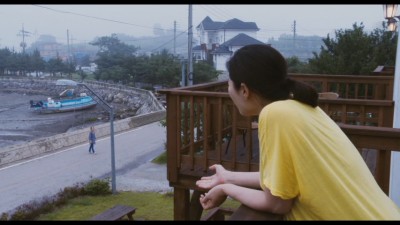
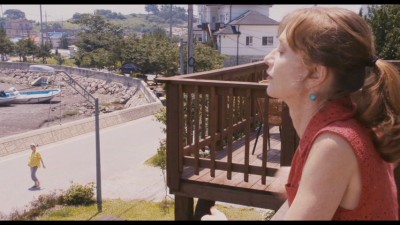
Of course, all of the free-flowing streams of conceptual/narrative wit and contemplative feeling Hong so expertly taps and channels from the Annes' (and the screenwriter character's) stories' teeming intertextuality would be for naught if what we could see and hear didn't work to make his sensibility come alive, but that's hardly the case. Strictly at the visual level, In Another Country is brilliant, the lighting and cinematography of Park Hong-yeol and Ji Yoon-jeong, along with Hong's understated, precise framings and compositions (and signature, spontaneous-appearing reframing zooms, which make the camera seem to respond almost biologically, instinctively, to the qualities and shifts in characters, settings, and scenarios; no-one since Altman has zoomed so endearingly and effectively) imbuing a feel -- the rare sunlight and much more frequently overcast grayness of a quiet, rundown, rather dull little still-life seaside town -- that's vital to the film's subdued but ultimately sublime emotional impact. Those who get excited (as I do) by the color-coding strategies of a Peter Greenaway (The Cook, the Thief, His Wife, and Her Lover) or a Fellini (Juliet of the Spirits) will find much to sink their teeth into here, with the orange of the lifeguard's T-shirt and tent, the billowy and bright-yellow blouse of the pregnant wife, and of course the different Annes' signature colors all bursting with semiotics ripe for the deciphering and enraptured imputing of meaning. On a more integral level, underemphasized, subtle, but clear visual rhymes -- the different Annes' double-take noticing of the bare-chested lifeguard emerging from the sea and their initial interactions with him, the framings and blockings markedly similar; two identically-composed shots that have, first, the pregnant wife calling down to the blue Anne, then the red Anne glancing down from the same position at the pregnant woman; the retrieval of one Anne's hidden umbrella by another, making for the perfect narratively unifying moment and leading into the most free, hopeful image on which to cut to the closing credits -- gratifyingly make visible and reinforce the free flow between the film's only very superficially separate, actually wholly interdependent, riffs on Anne's visit to Mohang.
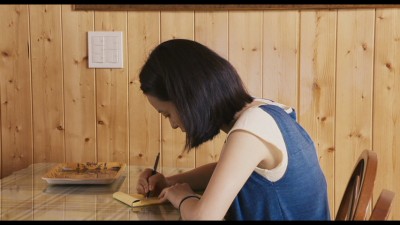
It's a remarkably serene flow that Hong achieves, despite the aesthetic, philosophical, and affective complexities that he's encompassing with his unique spryness, his singular ratio of cool, cerebral intellect to warm empathy and play. In Another Country, like all of Hong's films that this reviewer has had the privilege to see, is a veritable feast for the mind and the eyes, so its aforementioned lightness is a miracle; it's like an éclair, so very heavy in substance but so fluffy and delicate to the taste. It doesn't so much "tackle" its big, resonant ideas and themes -- disappointment and elusive fulfillment, fear and hope in life and love; the fraught, vertiginous process of creative invention and the strange relationships between an artist and their work, and between art and life -- as it does a surpassingly graceful and confident dance with them. It's a feat of visual and narrative choreography that blends its unpredictable, sophisticated steps into the most pleasant, relaxed, and fluid apparent simplicity -- another unmissable treat from one of the most surefooted, resourceful, and inspired auteurs working today.
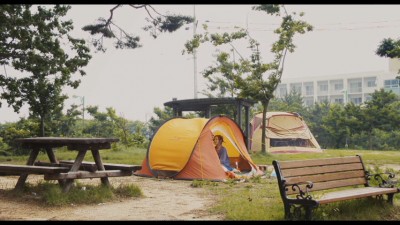
Video:
The very specific colors that Hong and cinematographers Hongyeol Park and Yunejeong Jee are working with (the blue/red/green codes of Huppert's characters' costumes, the bright orange T-shirt of the lifeguard, all against the gray and occasional sunlight of the drizzly beach resort town) are all vivid and pop nicely on this transfer, which preserves the film's original theatrical aspect ratio of 1.85:1. However, there is quite a bit of edge enhancement/haloing to be seen here, as well as a certain flatness to the image (originally shot on 35 mm) that suggests that some overuse of the dread digital noise reduction (DNR) has somewhat compromised the true celluloid texture of the film.
Sound:Both of the soundtrack options -- Dolby Digital 2.0 stereo and Dolby Digital 5.1 surround, primarily in English with non-optional English subtitles for scattered instances of Korean and French dialogue -- are lovely to listen to, with full, solid, clear, and crisp layers of sound all coming through beautifully, with no distortion or imbalance. Especially on the 5.1 track, the gusty ambience of the third-rate resort town and Jeong Yongjin's sweetly melancholy, carefully/rarely deployed piano score nicely point up the potential benefits of the surround effect, even for a smaller-scale, explosion-free film like this one.
Extras:Nothing but the film's U.S. theatrical trailer, which is merely adequate and doesn't hold a candle to Hong's much more clever and representative original trailer.
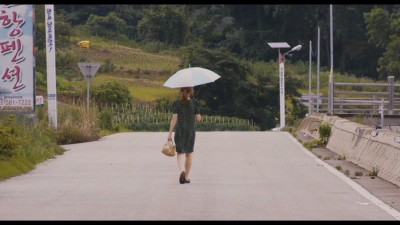
Hong Sang-soo's In Another Country is a work of delightfully casual cinematic mastery; as with Hong's last film, The Day He Arrives, its wit and cleverness are deceptively gentle and nonchalant, and the film's actually tremendous power and beauty catch you up short by building up gradually, organically. Here, we have French screen legend Isabelle Huppert playing three different (but perhaps not so different as they might seem) iterations of a French woman called Anne, who's visiting the out-of-the-way, rather rundown South Korean beach resort town of Mohang. Each one of the Annes -- a film director, a wealthy Seoul housewife, an unhappy recent divorcee -- is drawn to a studly and guileless young lifeguard (Yoo Jun-sang), flirts with various degrees of reckless involvement with married Korean film directors (Kwon Hae-hyo and Moon Sung-keun), and searches in vain for a mysterious, possibly symbolic lighthouse. It's a relatively simple, old-fashioned modernist-cinema concept (the framing device is a frustrated young Korean woman writing the script of the stories we're watching as a way to distract herself from a depressing familial conflict), but Hong delves and revels in it, making it blossom in the most intriguing and beguiling ways, with myriad connections and overlaps, blatant and subtle, made between the different Annes and their stories, and between the Annes and her young, Korean, female scriptwriting creator, too.
Hong is playing with narrative, offering us puzzles and self-reflexiveness galore, but in the process, he orchestrates the material for every kind of performative, dramatic, and narrative pleasure, with Anne(s)'s story at one moment almost moving us to tears via the lost, drifting, searching sense she has about her, but then at the very next shining with near-slapstick screwball romance, with plenty of fruitful detours through eccentric and endearing cross-cultural/cross-linguistic misunderstandings and sheer, unexpected lyricism, as well. Hong reels us in with the film's superficially modest, pretty surface, but by the time it's over, we've delectated over many more wonderful layers than we ever would have anticipated from such a compact, if clever, scenario, and all without feeling the surprising emotional and intellectual distances we've covered, the unanticipated breadth and depth of our journey; it's refreshing, not tiring. With In Another Country, Hong once again proves himself cinema's contemporary master of serious play, his self-aware approach renewing -- not exhausting or recycling -- the possibilities of cinematic storytelling in a way that energizes, making a purchase of the film for your home DVD library a well-advised choice, as you'll definitely want to take the uniquely rich, resilient ride again and again. Highly Recommended.
|
| Popular Reviews |
| Sponsored Links |
|
|
| Sponsored Links |
|
|
| Release List | Reviews | Shop | Newsletter | Forum | DVD Giveaways | Blu-Ray | Advertise |
|
Copyright 2024 DVDTalk.com All Rights Reserved. Legal Info, Privacy Policy, Terms of Use,
Manage Preferences,
Your Privacy Choices | |||||||









